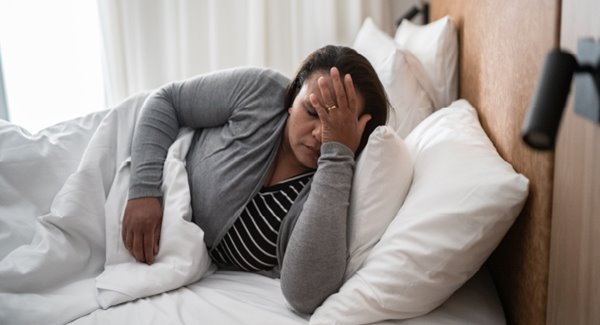Sleep Tips for Arthritis
Arthritis symptoms — both physical and emotional, like worrying about the coronavirus — can make it difficult to sleep, which can worsen pain. These strategies can help you get the rest you need.
1. Lack of Sleep Makes Pain Worse
Studies show that as many as 80% of people with arthritis have difficulty sleeping. Whether you are having trouble entering dreamland, tossing and turning through the night, or waking up before the sun rises, sleep deprivation can make pain worse and have a negative impact on your overall health. Follow these tips to get the shut-eye you need.
Reviewed 3/15/22
Reviewed 3/15/22
2. Talk to Your Doctor
It seems simple, but people with arthritis often forget to speak up about sleep issues. A restful night means more than dozing off quickly, it is also important to stay asleep and feel refreshed when you get up. Your doctor can help identify what is causing your sleep problem. In addition to pain, frequent trips to the bathroom, stress or breathing difficulties can lead to daytime fatigue. The solution can be as simple as developing better sleep hygiene.
3. Keep a Regular Sleep Schedule
Go to sleep and wake up at the same time every day, even on weekends and vacation. This will help your body develop an internal snooze clock. Making up for lost sleep on Saturday will only make it harder Monday morning. Most people need between six and eight hours of sleep each night. Avoid naps, which disrupt your natural sleep cycle. A consistent routine will help you sleep longer and improve the quality of your slumber.
4. Write in a Sleep Diary
Keep tabs on your bedtime habits for a few weeks. Remember to include what time you went to bed and woke up, any midday power naps, and how tired you felt throughout the day. Other helpful patterns to note include how much caffeine or alcohol you drank, if you took any medications, if you exercised and any stressful events that occurred during the day. Share the journal with your physician.
5. Get Moving
Research shows that people who are active sleep better. Men and women who get 150 minutes of moderate to vigorous activity each week are 65% less likely to feel tired during the day. But remember to get your heart rate pumping before sunset. A late-night workout increases your levels of adrenaline and stimulates brain activity, which can make it more difficult to fall asleep.
6. Power Down
When you turn off your cell phone, tablet and computer, your brain turns off too. Digital devices make it harder for us to wind down. Research shows that the artificial light from computers can interfere with sleep hormones in the brain. A study found that campers who spent a week without electronic devices were able to synchronize their internal clocks to the sun.
7. Avoid Caffeine and Alcohol
If you enjoy a cup of morning Joe, it’s unlikely it will affect your sleep at night. But that afternoon mocha latte might. Caffeine found in coffee, tea, soda and chocolate stimulates our brain and makes us feel more awake. Stick with water and caffeine-free beverages in the afternoon. Limit evening fluid intake to avoid middle-of-the-night bathroom visits. Smoking late at night and drinking alcohol can also cause you to toss and turn.
8. Reserve the Bed for Sleep and Intimacy
Has your once-serene resting place become a spot to watch television, finish work, fold laundry or other tasks? When you read in bed or write e-mails, you develop mental associations with the bed that can make it hard for you to fall asleep. Make your bedroom a sanctuary for sleep — keep the environment quiet, dark and at a comfortable temperature. Invest in a supportive mattress and cozy sheets.
9. Treat Stress
Do your thoughts race with worries as soon as you hit the pillow? Talk to a family member, friend or therapist about your stressors during the day. Relaxation techniques, such as meditation, yoga or other forms of cognitive behavioral therapy, can also help clear your mind before bed. If unsettling thoughts still keep you up, don’t stare at the clock. After a half hour, get out of bed. Read in a comfortable chair or have a cup of warm milk in the kitchen.
10. Go for a Sleep Study
If changing your habits hasn’t helped, consider an overnight exam at a sleep lab. During the procedure, electrodes are placed on the head, chest and legs and you go to sleep. Machines will monitor important biologic functions including brain activity, heart rate, eye movement and breathing rhythm through the stages of sleep. The study can help diagnose problems such as sleep apnea, restless leg syndrome, sleepwalking and other sleep problems.
11. Consider Medication
When all else fails, a temporary regime of sleep aids can help you reset your natural bedtime rhythm when used responsibly and under the supervision of a physician. Pain relievers can alleviate joint pain and sleep medications can help you fall and stay asleep. Drugs that treat arthritis, most commonly the corticosteroid prednisone, can cause insomnia and agitation for some people. Some people sleep better when they take their medicines in the morning. Consult your doctor about any medications or supplements you take.
Stay in the Know. Live in the Yes.
Get involved with the arthritis community. Tell us a little about yourself and, based on your interests, you’ll receive emails packed with the latest information and resources to live your best life and connect with others.


